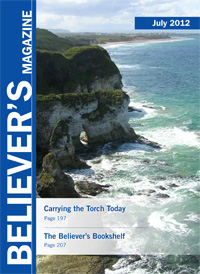The Epistle to the Romans, standing at the gateway to the epistle section of the Word of God, is a spiritual mountain range of a book, a faultless legal argument, and a sound foundation of divinely given truth. On it the believer can rest, and in it, rejoice.
At the end of chapter eight the climax is reached in the presentation of the gospel. The questions are asked: "Who can be against us?"; "Who shall lay anything to the charge of God’s elect?"; "Who is he that condemneth?"; "Who shall separate us from the love of Christ?". Any other writer may have left these as rhetorical questions, but Paul sets out wonderful answers. Following this, at the end of chapter eleven the apostle concludes his gripping argument which commenced with chapter nine, that Israel has a glorious future. His doxology states, "O the depth of the riches both of the wisdom and knowledge of God", and ends with, "to whom be glory forever. Amen".
But the reader of the book entering chapter twelve is presented with a challenge. This is given clearly, and we who are waiting "the redemption of our body" (Rom 8.23) must heed the call: "I beseech you therefore, brethren…that ye present your bodies a living sacrifice, holy, acceptable unto God, which is your reasonable service". The challenge is clear: "What will we do with our bodies now?". To "present" is to "yield yourselves as bondmen for obedience" (6.16, JND). Note, therefore, that there is presentation. Our bodies are to be given as living sacrifices.
This differs from the sacrifices of the Old Testament. It is a not a dead sacrifice as was placed on Tabernacle and Temple altars, but living; it is a personal sacrifice, not giving that which is dead in place of oneself; it is constant, continual, and intelligent in that the offerer understands the issues and responsibilities involved. Such a step is our reasonable (intelligent, JND) service - that which is well pleasing to God.
This involves separation. "Be not conformed to this world", that is this world and its society, which seeks to fashion our lives according to its standards, behaviour and expectations. The world presses ever more closely. Clamorous voices are all around, seeking to present to the believer what appears to be most attractive. Ungodly behaviour increasingly seeks to allure the Christian. The constant, erroneous assertion that science (so-called) has proven that God does not exist is loudly argued. The abandonment of all moral and spiritual principles is presented in strident tones. In the midst of all this the call is for believers to live a different life, conformed to His Word.
Separation is linked with transformation. We must not be conformed to this world (age): but rather be "transformed by the renewing of your mind". How can this be done? By adjusting our minds to the mind of God, that which is found in Scripture. Reading and meditating on His Word is the only way by which we can think and act as He would have us do. We listen to His voice and not the voices of those who have another master, he who caused Eve to fall.
Fourth, there is education. To present our bodies to God we will "prove" the will of God. That is, we put the Word of God to the test, not in unbelief, but rather to see the promises of God being fulfilled. What an education this is! The will of God is stated to be "good", that is, to be beneficial, to cause no harm but rather to be positively favourable. It is "perfect" in that it is complete with nothing else to add. In this way we will get to know our God, not in a theoretic way, but in reality.
To present our bodies, therefore, is what God desires. It is acceptable to Him. It tests us! By so doing, in the world where many live in rebellion against Him, we can be acceptable, that is, well pleasing, to Him. Note again the opening words of chapter twelve: "I beseech you therefore, brethren". "Beseech" is to call to produce an effect. "Therefore" indicates that we have a responsibility to respond to the call. "Brethren" points out that the call is for all believers. Having come into the good of gospel blessing let us attend to this exhortation and show our loving gratitude in pleasing Him, who made it possible for us to enjoy the bounty He gives.









